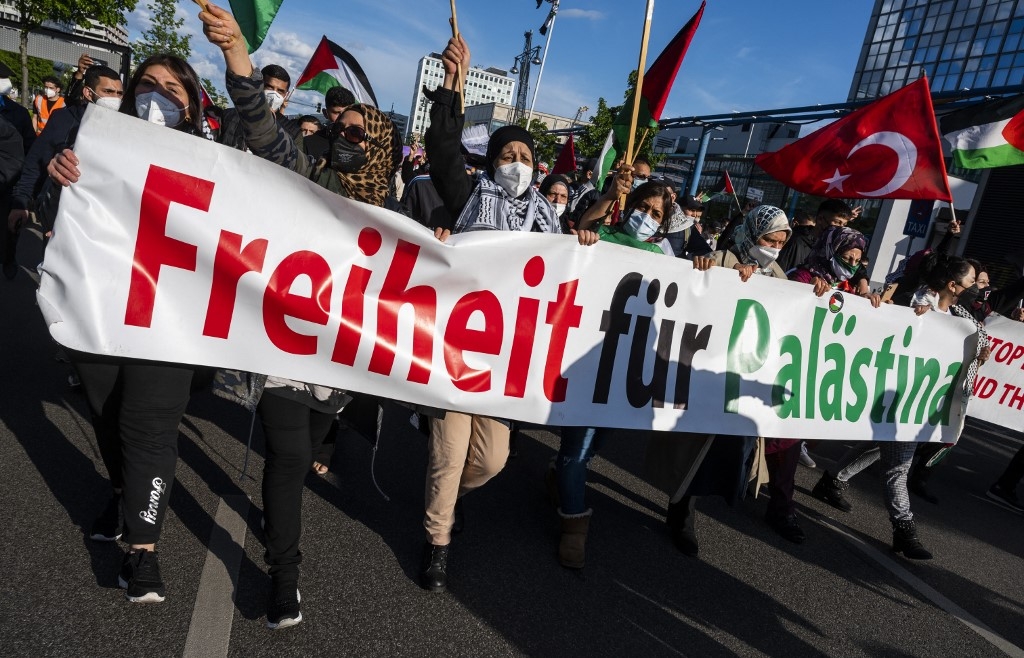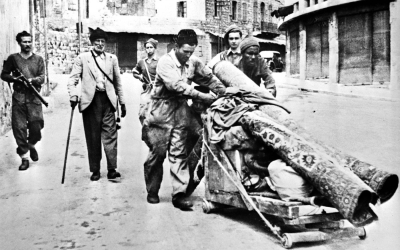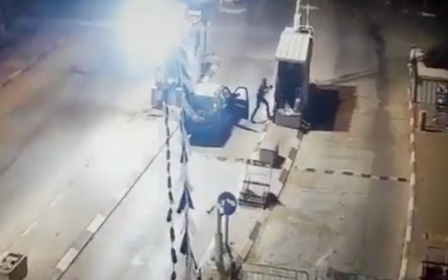Germany: Berlin temporarily bans pro-Palestine protests, citing 'public interest'

German police in Berlin have banned all pro-Palestinian demonstrations until 2 May, citing antisemitic statements made by some protesters during recent protests.
Following two years of pandemic-related restrictions, Sunday will see the return of Berlin’s May Day celebrations.
At least 15 separate demonstrations are scheduled for the comeback events. In the past, protests like these have drawn tens of thousands of people, with an atmosphere somewhere between a street party and a full-blown riot.
Yet, in an unprecedented move, police have banned all pro-Palestinian protests until 2 May.
'The mere fact of being Palestinian is enough to be criminalised, especially if you raise a political voice,'
- Aicha Jamal, Migrantifa
At least one was scheduled for Friday 29 April under the title “protest against Israeli aggression in Jerusalem”. The ban applied to this and any other “replacement protests,” which organisers sometimes use to try to circumvent bans.
In announcing the decision, Berlin police highlighted “unacceptable antisemitism” at pro-Palestine protests last week, where they say some of the several hundred protesters on 22 and 23 April made antisemitic statements.
“We had to witness criminal acts, antisemitic slogans, and exclamations of the worst kind,” said Berlin's Senator for Interior Iris Spranger. “That is totally unacceptable.”
In one instance caught on camera, a young man is heard yelling a racist slur in the direction of pro-Israel activists presenting as journalists, who later shared footage of the protests online.
In the flurry of news stories and opinion pieces that followed these protests, readers were told of attacks on journalists and police, along with antisemitic violence.

On the ground, the organisers say that the situation was very different. They say that the action of one protester should not be used to judge the rest of the people who took part in the protests.
“The atmosphere was great, with music and people of all ages and nationalities,” said Nizar Haddad, a Palestinian from Gaza whose group Palestine Speaks organised last Saturday's protest.
“One stupid, racist statement from a 15-year-old boy has been used to discredit the whole demonstration.”
Palestine Speaks did not organise Friday’s banned demonstration, but they are in close contact with its organisers.
Berlin is home to the largest Palestinian community outside the Middle East and has more than 25,000 residents with a Palestinian background. Many live in Kreuzberg and Neukolln, the neighbourhoods in which pro-Palestinian protests, including last week’s, typically take place.
Yet many Palestinians in Germany complain about what has been called “tabooisation” of their experience, in which Palestinian identity is not recognised by wider society.
“The mere fact of being Palestinian is enough to be criminalised, especially if you raise a political voice,” said Aicha Jamal, a spokesperson for the activist organisation Migrantifa, which demonstrates for social rights and against racism.
In the past year, several journalists with Palestinian roots have been fired over alleged antisemitic statements. In the case of Nemi el-Hassan, these included liking Instagram posts by the organisation Jewish Voice for Peace.
To ban this weekend’s protests, police cited an amendment to the Assembly Act introduced during the pandemic, which allows banning protests if the police say they pose a risk to public safety.
Berlin’s Administrative Court struck down a last-minute appeal against the pro-Palestinian protest ban on Friday.
“The special public interest in the enforcement of the prohibition decision outweighs the interest of the applicant,” the ruling said.
Inconsistencies
Berlin has a rich history of protest, where demonstrations against evictions, for instance, can draw thousands of people within a few hours’ notice.
Activists point to inconsistencies in how pro-Palestinian activists are viewed compared with other demonstrators. In Berlin, and throughout wider Germany, neo-Nazis and other far-right groups are free to hold marches virtually whenever they please. Racist slogans like “foreigners out!” are not uncommon at such rallies.
Aicha Jamal of Migrantifa, who will host a demonstration around the theme of “No war but Class War” on Sunday, said her organisation has already been warned by police against using any pro-Palestinian chants.
“They said they will use pro-Palestinian slogans as a reason to attack the demonstration,” she said.
At least 5,000 officers will be on hand to police the various rallies across May Day.
Palestine Speaks’ next Berlin demonstration is planned for 15 May, or Nakba Day, which commemorates the displacement and exodus of hundreds of thousands of Palestinians by Zionist militias.
But given this weekend’s ban on pro-Palestine activity, Haddad is anxious that authorities will attempt to silence this protest, too.
“They’ve done it to somebody else’s, so of course, they’ll do it to us,” he said.
Middle East Eye propose une couverture et une analyse indépendantes et incomparables du Moyen-Orient, de l’Afrique du Nord et d’autres régions du monde. Pour en savoir plus sur la reprise de ce contenu et les frais qui s’appliquent, veuillez remplir ce formulaire [en anglais]. Pour en savoir plus sur MEE, cliquez ici [en anglais].





